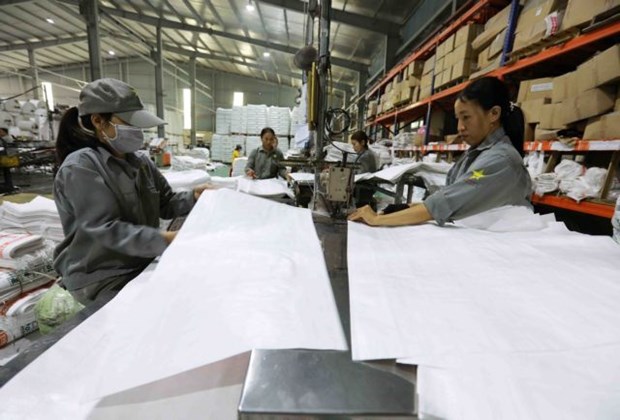Challenges persist for small and medium-sized domestic packaging companies
Despite the hard work of small and medium-sized domestic packaging companies to stay in tune with market demands and apply the latest production technologies, they continue to face a host of challenges.
Despite the hard work of small and medium-sized domestic packaging companies to stay in tune with market demands and apply the latest production technologies, they continue to face a host of challenges.
According to Ngo Duc Nhat, co-founder of HCM City-based Hoang Phat Packaging Co, which specialises in carton packaging production, this market segment had slowed down during the social distancing period due to restrictions in good transportation and import and export activities.
Similarly, the glass packaging segment was also affected when consumption of cosmetic products and high-end drinks in glass bottles slowed down as bottled water producers preferred to use plastic packaging, Nhat told thesaigontimes.vn.
In the post-pandemic period, Vietnam’s major import markets faced many difficulties and the risk of economic recession, so they cut back on goods imports and outsourcing orders. That had reduced the amount of packaging they consumed, especially those used to pack goods for export, Nhat said, emphasising difficulties local pulp packaging producers had been coping with in production activities.
Furthermore, dependence on imported raw materials, which had been significantly influenced by many relevant factors such as prices of gasoline and logistics services, also affected the firm's revenues and profits, he spoke to the online newspaper.
The Vietnam Pulp and Paper Association also agreed. It said packaging enterprises still faced many challenges, such as consumption competition among domestic enterprises due to many new production lines being put into production, harsh competition from foreign rivals, lack of raw materials and high raw material prices and transportation costs.
Moreover, the market has also been experiencing many changes in packaging trends and demands. For example, in the face of climate change, concerns about business sustainability were more important than ever, with a particular focus on packaging and waste generated from food, beverages and consumer products.
Therefore, domestic enterprises needed to grasp this trend to make the necessary changes to solve these challenges.
According to the association, several enterprises had converted packaging production technology from recycled PP plastic pellets - a material with abundant domestic supply. That helped them meet environmental protection requirements and avoid affecting manufacturing costs.
Haiquanonline.com.vn cited a representative of Dong Tien Paper and Packaging Co saying that consumers' awareness about the classification and recycling of waste was increasing. Still, recycling in Vietnam faced many obstacles due to the lack of collection facilities and the low quality of output materials because of old technology, leading to commercial recycled products not having high value.
Therefore, the company invested 57.8 billion VND in a system of factories and production lines for toilet paper and packaging from recycled materials.
For Hoang Phat Packaging Co, Nhat said his company was striving to automate production processes, facilitating IT appliances to improve the management quality and finding solutions to improve the quality and the design of packaging products to meet the requirements of the demanding partners.
Diversifying packaging products would also be included, he said.
In the long run, Nhat also called for packaging enterprises, especially small and medium-sized ones, to foster their cooperation.
He explained that currently, each enterprise often covers all stages or several stages in the production process. That forced them to divide their investment capital and buy out-of-date machines.
If the firms could team up, each enterprise could specialise in one stage to invest in a modern, high-quality machine for that particular stage.
Thanks to co-operation, the finished product of each stage would have a high quality, and all members of the production chain would benefit from that.
According to Nhat, quality was the most effective language for promotion, and open-minded and cooperative thinking would help the firms have more customers.
A recent survey by Vietnam Report showed that there remained huge room for the domestic packaging industry to promote growth in the future. Specifically, when Vietnam and many countries that were the main export markets of packaging enterprises had also switched to a strategy of living with COVID-19, the sector had many prospects for recovery as high consumption would open growth opportunities for the packaging industry.
On the other hand, free trade agreements such as EVFTA, CPTPP, and RCEP continued to open up export opportunities for industries that used a lot of packagings such as agriculture, forestry, fishery, and processing industry, along with the large demand for high-quality packaging in the world such as high-grade packaging paper, which presented great export opportunities for Vietnam's packaging industry.
FiinGroup also said in its report that packaging was one of the fastest growing industries in Vietnam, with an annual growth rate of 13.4 per cent between the 2015-2020 period. It was expected to continue double-digit growth in the coming years.
The strong development of the packaging sector in Vietnam was driven by solid growth of such related sectors as F&B, consumer goods, export activities, and the robust development of modern trade.
To support the development of the local packaging industry, FiinGroup mentioned several solutions for domestic packaging companies, including catching up on the key trends in global packaging materials and designs, such as environmentally friendly and biodegradable products or products from recycled materials.
They should also have a thorough understanding of the requirements/commitments on certification of origin, technical standards, and sustainable development of the bilateral and multilateral FTAs Vietnam signed in recent years to boost exports.
They should also pay attention to accelerating digital transformation, and automation of manufacturing processes to improve efficiency and product quality, it said./.









